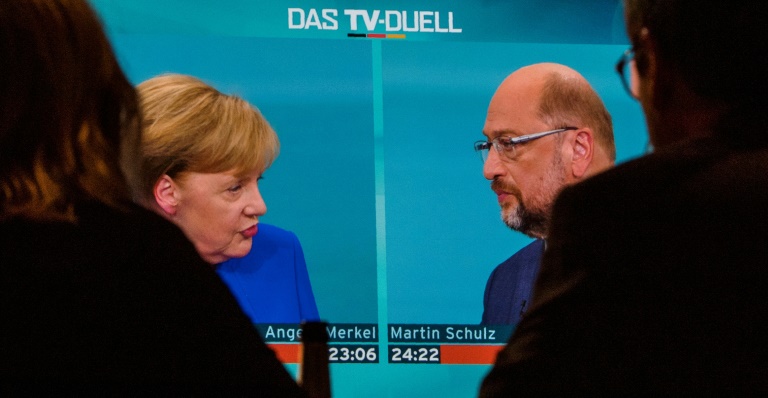Angela Merkel appeared to be powering ahead Monday to a fourth term as chancellor of Germany, after her rival Martin Schulz failed to halt her advance in a crucial televised debate three weeks before elections.

Sunday’s prime-time TV clash had been billed as Schulz’s last chance to sway a decisive share of voters to his cause and halt a devastating popularity slide.
But polls following the 90-minute showdown, which was watched by 16.1 million people, gave Merkel the clear edge over Schulz, a former European Parliament chief.
“Merkel came out as sure, Schulz was hardly able to land a punch. The candidate is an honourable man. But being honourable alone won’t make one chancellor,” wrote Sueddeutsche daily commentator Heribert Prantl.
With millions of voters still undecided, Schulz had been looking to the debate to erode the commanding 17-percentage point lead of Merkel’s CDU party and their Bavarian CSU allies ahead of the September 24 polls.
Schulz, who had previously complained that Merkel was lulling voters to sleep with her refusal to engage in combative debate, went on the offensive quickly on the hot-button issue of migration.
He accused Merkel of failing to coordinate plans with EU neighbours when she decided to open Germany’s borders in 2015 to allow in refugees, many from war-torn Syria and Iraq.
But Merkel was not rattled, countering that: “In the life of a chancellor, there are moments when you have to make a quick decision.”
And as Schulz voiced his wish to end EU membership talks with Turkey amid escalating tensions with Ankara, Merkel stole the issue from under his feet as she said she did not “see them ever joining” the bloc.
Together with EU counterparts, she will examine if “we can end these membership talks”, Merkel added.
Merkel’s tough line comes after Ankara arrested two more German nationals for “political reasons”, according to Berlin.
The plunge in relations began after Germany sharply criticised Ankara over the crackdown that followed last year’s failed coup attempt there.
– ‘Stiff and dowdy’ –
But for the minor skirmishes, commentators lamented it was more of a “duet than a duel” in the spirit of the right-left “grand coalition” Merkel has led since 2013.
“That wasn’t a TV debate, it was a torturous 90-minute grand coalition therapy discussion,” said Dietmar Bartsch, a candidate from the far-left Die Linke.
“Nothing on climate, nothing on education, nothing on digitalisation,” Greens party leader Cem Ozdemir tweeted during the event. “When will they start talking about the future?”
Opinion polls following the programme showed a clear victory for Merkel, with public broadcaster ARD saying 55 percent found her more convincing while 35 percent plumped for Schulz.
An ZDF survey was closer but still had Merkel ahead with 32 percent, against 29 percent who thought Schulz performed better.
Merkel “appeared to be more competent than in any previous duel. She was not brilliant, but sure. Schulz, on the other hand, was so stiff and dowdy, like Merkel was in previous duels,” wrote Prantl.

Journalists watch a televised debate between German Chancellor and leader of the conservative Christian Democratic Union (CDU) party Angela Merkel and Martin Schulz, leader of Germany’s social democratic SPD party and candidate for Chancellor
Munich’s Merkur daily also noted that “in an increasingly uncertain world which is led by testosterone-filled leaders, people don’t know what Schulz wants. But they know what Merkel can do.”
Members of Merkel’s party feted the results, with Julia Kloeckner tweeting: “Angela Merkel: Stateswoman. Schulz: election candidate.”
But Schulz’s Social Democrats equally applauded the man who is known to be a fiery orator.
Manuela Schwesig, Mecklenburg-Western Pomerania state premier, said: “Martin Schulz has shown that he can be chancellor.”
Sunday’s so-called “television duel” between the election campaign’s two leading candidates was the dramatic high point of Germany’s sleepy electoral campaign season.
Having already fought three previous general elections, the famously cautious Merkel is no stranger to the TV format.
But this was the first time that she has prevailed, with surveys immediately after each of the previous three editions showing a popularity bounce for her opponents.
Support Local Journalism
Add The Citizen as a Preferred Source on Google and follow us on Google News to see more of our trusted reporting in Google News and Top Stories.






